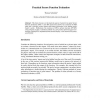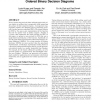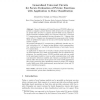264 search results - page 2 / 53 » Minimal-Latency Secure Function Evaluation |
INFORMATIKTAGE
2008
15 years 2 months ago
2008
: This thesis focuses on the practical aspects of general two-party Secure Function Evaluation (SFE). A new SFE protocol that allows free evaluation of XOR gates and is provably se...
109
click to vote
CCS
2006
ACM
15 years 4 months ago
2006
ACM
Privacy-preserving protocols allow multiple parties with private inputs to perform joint computation while preserving the privacy of their respective inputs. An important cryptogr...
112
click to vote
ICISC
2008
15 years 2 months ago
2008
Secure Evaluation of Private Functions (PF-SFE) allows two parties to compute a private function which is known by one party only on private data of both. It is known that PF-SFE c...
109
click to vote
ACNS
2009
Springer
15 years 7 months ago
2009
Springer
Abstract. Two-party Secure Function Evaluation (SFE) is a very useful cryptographic tool which allows two parties to evaluate a function known to both parties on their private (sec...
108
click to vote
FSTTCS
2009
Springer
15 years 7 months ago
2009
Springer
ABSTRACT. A non-local box is an abstract device into which Alice and Bob input bits x and y respectively and receive outputs a and b respectively, where a, b are uniformly distribu...



